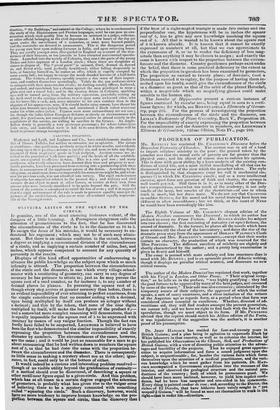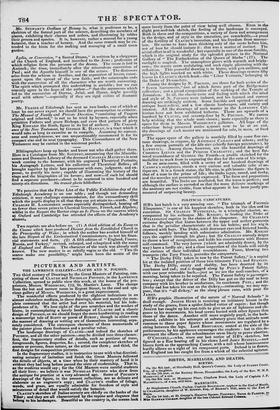PROGRESS OF PUBLICATION.
MR. KENNETT has reprinted Dr. CHANNING'S Discourse before Me Benevolent Fraternity of Churches. The sermon was in aid of a fund to impart religious ministry to the poor : the ground taken by the preacher was that the moral evils of poverty are far greater than the physical ones ; and his object of course was to enforce his opinion. This is done with great ability, by a keen analysis of the existing con- ditions of social life, and a most skilful marshalling of all that can be discovered in favour of the view which the preacher takes. The style is distinguished by that eloquence (may we call it mechanical elo- quence ?) in which Dr. CEIANNING excels ; and as a mere intellectual exercise, apat t from any question of faith and charity, the sermon is well worth per;:sal. Still there is in it, as in many other of the Doc- tor's compositions, somewhat too much of the academy ; it not only smells of the lamp, but smacks of the rhetorician—of one to whom truth is much, but her dress more. We do not say that CIIANNING resembles SENECA, for his moral and his social training have been too different to allow resemblance ; but we think, at the court of NERO he would have been exceedingly like him.
The Eighth Volume of Mr. COLUMN'S elegant edition of the Modern Novelists commences the Disowned; to which its author has prefixed an essay on Prose Fiction. Mr. BeravEa divides his subject into two classes ; the first consisting of narrative (or epic) fictions, the second of dramatic. In the former, he places all the novels which have been written till the close of the last century ; and dates the rise of the dramatic prose story from the appearance of HORACE WALPOLE'S Castle of Otranto and Mrs. RADCLIFFE'S romances,—except that their works contain no character, the production of which was reserved for the Miss PORTERS. The different novelists of celebrity are slightly and shortly characterized by the author ; and a pretty long examination is given to SCOTT and himself. The essay is penned with more sobriety and less smartness than is usual with Mr. BULWER ; and is an agreeable piece of didactic writing, though it displays no peculiar critical acumen, and discovers no new critical canons, The author of the Modern Danciad has reprinted that work, together with his Virgil in London, and Other Poems. " Their original recep- tion," as he tells us in the preface, "was highly gratifying : they had the good fortune to be approved by many of the best judges, and censured by some of the worst." Their sale was also extensive ; stimulated by the temporary nature of their subjects, the approval of which the writer speaks, a sort of saucy smartness, and a close imitation of the writers of the Augustan age as regards form, at a period when that form was considered almost essential to excellence. Whether, divested of ad- ventitious aid, they will find readers amongst the present generation, we cannot tell ; and we have no right to find fault with the fact of the speculation, though we must object to its form. If Mr. PICKERING advised that the reprint should match his Aldine edition of the Poets, it was injudicious; if the suggestion was the author's, it is another proof of his presumption.
Dr. JOHN HANCOCK has resided for four-and-twenty years in British Guiana ; and a plan being in agitation to supersede Black by White labourers in that country, as well as to colonize the interior, he has published his Observations on the Climate, Soil, and Productions of British Guiana, with a view of directing public attention to the advan- tages and feasibility of the projects. That he enjoyed great opportu- nities to acquire information and form a sound judgment upon the subject, is unquestionable ; for, besides the various facts which force themselves upon the attention of a medical practitioner, and the vari- ous knowledge which be must gather from his patients, Dr. Haw- COCK accompanied a Government expedition into the recesses of the interior, and observed the geological structure and the natural pro- ductions of the country ; both of which he pronounces good. We should have been more inclined, however, to yield him implicit confi... dence, had he been less sanguine and one-sided in his statements. Every thing is painted couleur de rose ; and, according to the Doctor, the riches of El Dorado, that have hitherto been vainly sought in " yet unspoil'd Guiana," will be fouled
d as men set themselves to work in the right...that is under his—direction.
Mr. STEWART'S Outlines of Botany is, what it professes to be, a skeleton of the formal part of the science, describing the members of plants, exhibiting their classes and orders, and illustrating by tables their genera and species. It is, however, rather a manual for a young botanist, than a teacher of botany. And the same remark may be ex- tended to the hints for the making and managing of a small town garden.
_Lydia, or Conversion, "a Sacred Drama," is written by a clergyman of the Church of England, and inscribed to the Jews ; professors of which religion form the persons of the drama. The scene is laid in Antioch; the time, immediately after the miraculous conversion of Paul ; and the Apostle himself is one of the actors. The distresses arise from the schism in families, and the separation of lovers, conse- quent upon the spread of the new faith ; arid the catastrophe ends with the conversion of all the characters who are worth converting. The spirit which prompted this undertaking is amiable ; but we can scarcely agree in the hope of the author—" that the arguments which led to the conversion of Dorcas, Juba!, and Haan, might possibly avail with others "—especially if they are rigid critics of dramatic poetry.
Mr. FRASER of Edinburgh has sent us two books, one of which at least he can never expect we should have the presumption to criticize. The Manual of Family and Private Devotion, "consisting of Prayers original and selected," is not to be tried by laymen, especially when primitive Fathers and grave Bishops, and even that pattern of piety King EDWARD the Sixth, figure in its list of authors. The Concord- ance of the New Testament, by GEORGE K. HANNAY, is a tract which it would take as long to examine as to compile. Assuming its correct- ness and completeness, we can unquestionably recommend it for its compact size and its neat typography. This Concordance of the New Testament may be carried in the waistcoat pocket.
Bibliographers heap up books and know not who shall gather them. Jere is a Catalogue from Mr. SOTHEBY, announcing that the Miscella- neous and Dramatic Library of the deceased CHARLES MATHEWS is next week coming to the hammer, with his engraved Theatrical Portraits, his Autograph Letters, and his collection of Theatrical Relics ; all brought together by their late possessor with care, judgment, and ex- pense, to gratify his taste ; capable of illustrating the history of the stage and the biographies of its heroes; and now—if each lot should find a separate purchaser—about to be scattered in nine hundred and ninety-six directions. Sic transit gloria bibliothecw.
We perceive that the Prize List of the Public Exhibition-day of the Edinburgh Accademy is on our table ; and though not demanding criticism, it may challenge commendation, for the extraordinary skill which the pupils display in all that they can yet attain to—words. One CHARLES H. LANGHORNE seems especially distinguished, bearing off no fewer than seven prizes in Classical literature, French, and Algebra ; whilst in the Report the Rector sings an Jo Pecan on the success which at Oxford and Cambridge has attended the efforts of the Academy's Two reprints are also before us. (1) A third edition of An Essay on the Causes which have produced Dissent from the Established Church in the Principality of Wales ; in which the author has availed himself of the late Report of the Ecclesiastical Commissioners, to test his finan- cial statements and facts. (2) A fifth edition of " England, France, Russia, and Turkey," revised, enlarged, and rebaptized with the name of England and Russia. The character of the work was already well known. The new matter is as rabidly vague as the old. " Two ifs scarce make one possibility," might have been the motto of the writer.



























 Previous page
Previous page